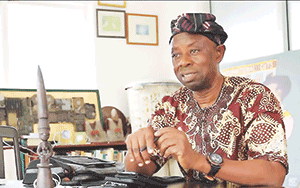Dazzling Mirage, the latest film by award-winning filmmaker, Tunde Kelani, premiered on November 7 at the Muson Centre in Lagos. A few days to the event, the filmmaker, who has been very critical about movie pirates, told Assistant Life Editor, TERH AGBEDEH, that he would want pirates to swoop on this new work. Find out why in this interview.
Congratulations on your lifetime achievement awards from Nollywood Movies Awards (NMA); it must have made you feel very good about what you do.
It made me feel old and then reminded me of the projects I needed to do before I could be considered for a lifetime achievement award. I didn’t think that I have enough to have been awarded a lifetime achievement.
When people start talking about lifetime, they are actually saying maybe you should be in retirement or should have been in retirement. You know I am sort of a late starter; I spent most of my developmental years learning everything about what I am doing. It took a long time for me to develop myself. I started everything late; even family life. But I just considered that suddenly, by several historical factors, I seem to have come at a time there is rapid advancement in technology of making motion pictures. That kept me learning again in the later part of my career, and it is very exciting because now we have the experience, the maturity and access to the tools to make all those wonderful films to tell the stories that we wanted to tell. And then, suddenly, we now hear lifetime, when I thought that I still have a couple of films to do.
When does one start early?
I thought that coming at the pioneering stage of filmmaking in Nigeria, you have to learn a lot on the job. Remember, in those days, we didn’t have the right information. For instance, you had to subscribe to the British Kinematograph, Sound and Television Society (BKSTS), the British cinematographic society in England, to get the magazine to find out about technology. And then you have to become an associate member of the British Film Institute (BFI) and so on. At the time, we didn’t have the internet. Then suddenly, you realise that if you wanted to read on any topic today, you could just click on Goggle. There has been a lot of difference between then and now. So, if I spent 20 years in preparation, chances are that with the internet, social media and so on, anybody coming into the industry may spend five years. That is what I meant by ‘it took forever for me’.
You started as a photographer.
It was photography that attracted me in the first place because it just blew my mind when I was very young that, through this box, you could actually freeze something that you could develop and keep as a moment in time. The other day, I retrieved a picture of my sister that I took in 1975 and was able to compare with her growing daughter what they look like in 2014. Only photography could have done anything close to that. But I came in contact with cinema and it was another experience altogether. While in a darkroom trying to develop one picture, a motion picture does 25 of the picture in one second. It was something else and what you got out of it was an illusion of movement and then when you combine it with sound, it is like playing god because this picture can do anything, can say anything. For me, film still remains the most powerful medium of communication.
Those who have followed your work would say that you deserve that lifetime achievement award because your movies are well-known. Is it a function of calming down to learn the art that has made your name popular?
I wasn’t concerned about any of those things. I just had stories that I wanted to share. I initiate my projects. I thought I had access to stories that other people didn’t care about and I felt that I could share these stories with the audience wherever they may be. So, first of all, I was convinced. I follow my instinct and might have selected what I felt would be of interest to the audience and I was consistent. I meant to use the medium first of all to express myself culturally on the one hand and then to affect a need for film that will be meaningful and have social relevance.
It is a difficult thing to be consistent; how difficult was it to stay true to what you intended to do?
It is tough. In fact, sometimes I have regrets when I look around and see that I could have managed things better. I could have been really wealthy. But I worked against the status quo. I knew people were making money on the market by dumping anything there. I established first my own standards; that I would not perform below this standard and I would not do what other people were doing, that I would continue with whatever it took to be consistent. In fact, if I made any money back, I put it on the next one, most of which, for me, was experimental, as the technology kept shifting. I had to find new audiences and so on. Each one was challenging on various levels.
Would you say that piracy is among the challenges your works face?
In fact, it is a threat because that could have stopped me completely. But somehow, I still managed to get people to support whatever I did and got money together when commonsense would have suggested that I took the money and go to do things that were very safe to get returns and become rich. But somehow, I felt really stupid by making another movie (laughter).
What have you done to stop pirates from feasting on your movie, Dazzling Mirage, billed to premiere on November 7?
The thing is to extend the windows before coming down to DVD because once you come down to DVD level, chances are that you will get pirated. But if I found the funding and sponsorship, especially to disseminate this kind of film, it is a film that I would want pirated because of the message, the social relevance of the film, because we need to inform the people. Although it is an entertaining love story, then it talks about social awareness, about knowing more about sickle cell disorder and suggesting at the end of the film that we know our genotype. Not only that, (it suggests) that we all attend genetic counselling because we thought we know about genetic disorders, whereas we are all ignorant. So, for the sake of that, I would give it away free.
You adapted Dazzling Mirage from a play. Apart from the beauty of the play, what else informed your doing this movie?
Somehow, I seem to have been drawn to positive representation of African women, and I thought that in Africa we really didn’t appreciate our women and their contribution to society. So it falls within that kind of story. But again, we had done stories that had health issues like in Ayo ni mo fe, which dealt with the management of the mentally ill in the society. But something about Dazzling Mirage was just right. When I came across it, it talks about a woman living with sickle cell disorder and her triumph over the affliction and the support of family, friends and society. Again, something extra for the audience to take away essentially to make us all share the pain. So, it is a special project to me.
Was doing this film as exciting as doing your first film?
Exactly, that is the point because at any point in time there has to be an attraction, and anything I do, I sort of develop empathy. I just fall in love with whatever the theme of each film is. And at that point, it is the most important thing to me before I move on to something else. That is my first consideration; telling a good story and making sure that it is socially relevant.












